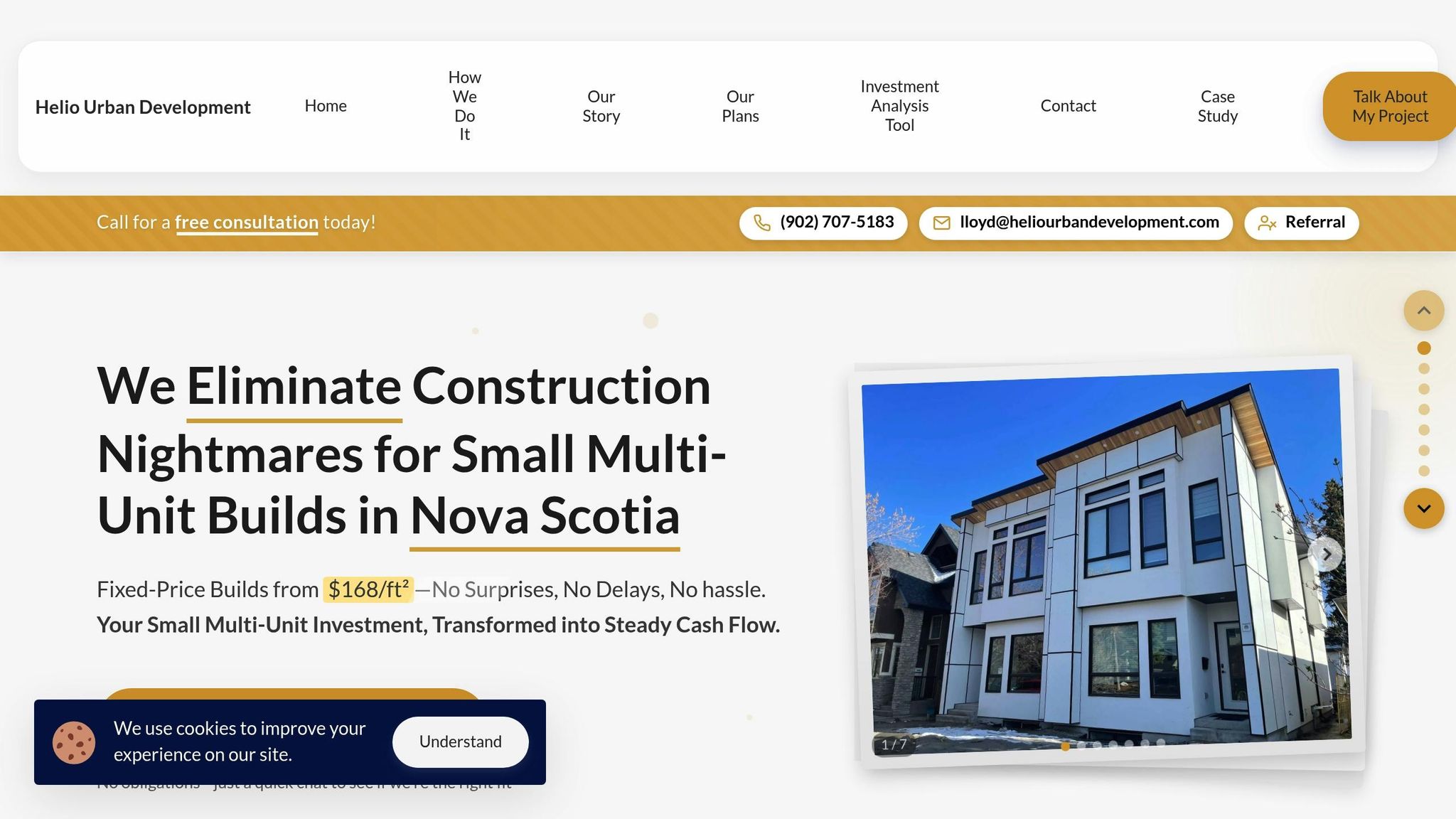Want to save on taxes while building income properties in Nova Scotia? Understanding construction loan interest deductions is key. Here's what you need to know:
- What qualifies for deductions? Loan interest must directly relate to building income-generating properties, like rentals or commercial spaces.
- Key requirements: Keep detailed records, ensure the loan is exclusively for construction expenses, and maintain compliance with CRA guidelines.
- Why fixed-price contracts help: Predictable costs make tax planning easier and reduce audit risks.
- Provincial rules matter: Local zoning, building timelines, and CMHC programs can impact your tax benefits.
Tip: Work with tax experts and use clear documentation to maximize deductions and avoid compliance issues. Ready to learn more? Let’s dive in.
Construction Loan Interest: Tax Rules
Basics of Construction Loan Interest
Construction loan interest works differently from traditional mortgages because the loan is disbursed in stages. As construction progresses, the balance grows with each draw, affecting how interest is calculated and when it can be deducted. For instance, Helio Urban Development's fixed-price model, starting at $168 per square foot, allows for a more predictable estimate of interest costs [1]. These principles align with the Income Tax Act's specific rules for interest deductions.
Income Tax Act Guidelines
The Canadian Income Tax Act provides clear rules for deducting construction loan interest:
- The interest must be tied to acquiring or constructing property.
- The property must be intended to generate rental income.
- Proper documentation of expenses is required.
- Interest rates must be reasonable and align with market standards.
Grasping these loan-specific details is key to making accurate tax deductions. For example:
"Every day of delay was a lost rent cheque. Helio's in-house crew kept the timeline on track, so I started collecting rent a full month earlier than I expected!" - Daniel T., First-Time Duplex Investor [1]
Interest and Additional Costs During Construction
In addition to meeting legal requirements, managing extra costs during construction is critical. A streamlined building schedule can help avoid unnecessary expenses. As highlighted in Halifax:
"I was braced for cost overruns and endless delays, but Helio kept every promise. In less than a month, my short-term rental was fully booked - without a single financial nightmare." - Lloyd L., Property Owner [1]
Qualifying for Interest Deductions
Loan Use Requirements
To qualify for construction loan interest deductions, it's crucial to follow specific rules about how the borrowed funds are used. According to Canada Revenue Agency (CRA) guidelines, the loan must be used exclusively for construction-related expenses. This includes costs like materials, labour, and other direct expenses tied to the project. Fixed-price contracts, such as those offered by Helio Urban Development at $168 per square foot, can simplify the process. These contracts provide clear, predetermined costs, making it easier to track and calculate interest accurately.
Property Income Purpose
For interest deductions to apply, the property must be built with the intention of generating income. This income could come from residential rentals, short-term accommodations, commercial leases, or mixed-use projects. It's important to document the income-generating purpose of the property before construction begins and maintain that intent throughout. Be aware that any personal use of the property could impact your ability to claim interest deductions.
Required Records
Detailed records are critical to support your claim for construction loan interest deductions. Keep all relevant documents, including loan agreements, draw records, bank statements, and contracts that confirm the property's income-generating purpose. These records not only help with CRA compliance but also act as evidence in case of an audit. Working with a tax expert can help ensure your documentation meets current requirements, giving you peace of mind when claiming deductions.
Can You Write Off Construction Loan Interest? - Civil ...
sbb-itb-16b8a48
Nova Scotia Investment Property Rules
Nova Scotia has specific regulations that influence how construction loan interest can be deducted for investment properties. Knowing these rules is key to maximizing your tax benefits while staying compliant. These provincial rules work alongside federal guidelines, shaping how you approach tax deductions.
CMHC Programs
The Canada Mortgage and Housing Corporation (CMHC) provides financing options that can impact the deductibility of interest on construction loans. Their fixed-rate programs offer stable interest costs during the construction phase, which can simplify tax planning.
Local Building Rules
Zoning and building regulations in Nova Scotia directly affect construction timelines and how much interest accrues. Municipal rules set the start and end dates for construction, which influences the amount of deductible interest. For example:
"They cut a full two months off my usual build - those extra rents basically covered my closing costs!" – James R. [1]
The timing of permit approvals and inspections also plays a role in the construction schedule and interest accumulation. Choosing builders familiar with local rules can help avoid delays and optimize interest deductions.
Helio Urban Development Services

Helio's fixed-price model provides cost certainty, making it easier to calculate deductible interest and plan your taxes effectively. Their AI-powered scheduling system speeds up construction, potentially reducing the interest that builds up during the project.
Take this example: a duplex in Colchester was built for $599,000 (including land) at $165 per square foot. The project was completed in 7 months and generated $4,400 in monthly rental income with full occupancy [1]. In another case, a 4-plex was finished in 9 months, with pre-leased units bringing in $9,600 in monthly rental revenue [1]. These examples highlight how efficient management of timelines and costs can enhance profitability.
Tax Benefit Strategies
Get the most out of your deductions by focusing on careful planning and thorough documentation. Here’s how you can make the most of tax benefits while staying compliant with CRA regulations.
Tax Expert Consultation
Working with experienced tax professionals during your construction project can make a big difference. Consider involving them at key stages, such as:
- Before finalizing loan agreements
- When setting up your record-keeping system
- During major project milestones
- At tax filing time
Their guidance can help you navigate complex tax rules and maximize your deductions.
Record Keeping Methods
Keeping detailed and organized records is crucial for supporting your interest deduction claims. Use separate files for different types of documents, such as:
| Document Type | Required Details | Purpose |
|---|---|---|
| Loan Statements | Monthly interest charges, principal payments | Track deductible interest |
| Construction Invoices | Date, amount, description | Link expenses to loan use |
| Project Timeline | Start/completion dates, inspection records | Validate construction period |
These records not only support your claims but also align well with the simplicity of fixed-price contracts.
Fixed-Price Building Benefits
Fixed-price construction contracts can simplify tax planning in several ways. Helio Urban Development, for example, offers a standard rate of $168/sq. ft. with clear financial benefits:
- Predictable Interest: Knowing the upfront cost allows accurate interest forecasting.
- Simplified Documentation: Fixed pricing eliminates the need to track variable costs.
- Lower Audit Risk: Transparent costs make it easier to justify your deductions.
"I've built before and was burned by endless 'surprise' bills. With Helio, the final price never changed - even when materials got scarce. I'd trust them again in a heartbeat." – Sonia M., Rental Property Owner [1]
Summary
Tax Rule Overview
If you're a property investor in Nova Scotia, understanding the rules around construction loan interest is crucial.
Key Requirements for Interest Deductibility:
- The interest must directly relate to constructing an income-generating property.
- Loans should have clear documentation connecting them to the construction project.
- Certain soft costs incurred during construction may qualify as deductions.
- Keep all relevant records for at least six years.
Eligibility Criteria:
- The property must be used solely to generate income.
- A well-documented construction timeline is essential.
- Interest charges should align with standard market rates.
- Personal and business expenses must be accounted for separately.
These guidelines can help you navigate the process effectively.
Next Steps
To stay compliant and maximize your deductions for construction loan interest, follow these steps:
Prepare Your Documentation:
- Collect all loan agreements and financial statements.
- Set up a dedicated system to track expenses accurately.
- Keep digital copies of all related documents for easy access.
- Schedule regular consultations with a tax professional to stay on track.
Once your documentation is in order, shift your focus to planning your project effectively.
Plan Your Project:
- Explore fixed-price construction options to simplify tax planning.
- Consider Helio Urban Development’s pricing model of $168/sq. ft. for better cost predictability.
- Adjust your construction timeline to reduce the amount of interest accrued.
- Develop a clear rental strategy before construction begins to ensure a smooth transition to income generation.



